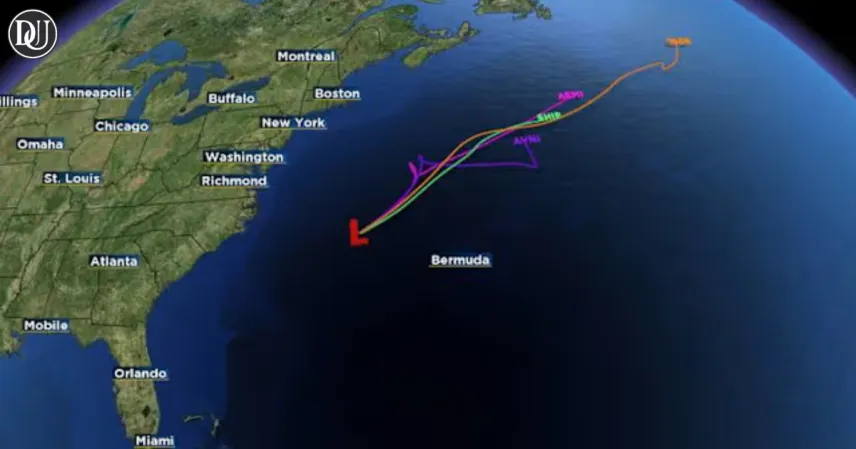Tropical Storm Dexter seemingly appeared in the Atlantic almost overnight, didn't it? One moment you're going about your day, the next, the National Hurricane Center is already issuing alerts about a new named system. It's truly wild how quickly these things can spin up, you know? Like, it just pops onto the radar as a tropical depression, then boom, it's got a name and everyone's scrambling to see where it's headed. I mean, my phone buzzed with the NHC update, and I immediately thought, "Oh, here we go again."
The Sudden Appearance of Dexter 🌀
Honestly, it felt a little out of the blue, this Dexter formation. We're well into hurricane season, sure, but some systems just feel more... stealthy. It started gaining strength in the Atlantic, and that's always a red flag, isn't it? The sheer speed from a disorganized cluster to a named storm is what always gets me. It makes you realize how volatile that stretch of ocean can be during these months. You just watch the cone and hope for the best, basically.
NHC's Initial Assessment & Landfall Fears 🚨
Initial reports from the National Hurricane Center were pretty serious about the potential for US landfall. I remember seeing headlines, like the one from The Economic Times, talking about major updates and concerns. That's always the immediate worry, isn't it? Any time a system forms in the Atlantic and starts moving westward, everyone along the coast holds their breath. It's that familiar dread – are we going to have to board up? Is the power going out? The speculation, the constant checking of models… it's exhausting, even for those of us just watching from afar. You sort of live vicariously through the anticipation of those living in the direct path.
A Sigh of Relief, For Now... 🌬️
But here’s the thing, it looks like Tropical Storm Dexter has, thankfully, decided to steer away from the US mainland. Weather.com reported it was heading away, which is, honestly, a huge collective sigh of relief for so many. It's like, you prepare for the worst, and then it veers off, and you're left with this weird mix of gratitude and exhaustion. Still, it doesn't mean it's not impacting other areas, or that the threat is completely gone. Hurricanes, or even strong tropical storms, have a way of leaving their mark, even with a near miss. The lingering swells, the potential for rip currents – it's never really just over.
Watching the Horizon: Other Systems brewing 🛰️
Of course, this being hurricane season, there’s never just one storm to worry about, is there? The same Weather.com report mentioned two other areas to watch. That’s the nature of it, I guess. You clear one hurdle, and there are two more forming behind it. It's a constant vigilance act. These other systems are just depressions or potential developments right now, but we all know how fast that can change. I've noticed a pattern, personally, where one big named storm tends to get all the attention, but then another one quietly strengthens right behind it. It’s a good reminder to keep an eye on the broader Atlantic picture, not just the currently named storms.
The Bigger Picture: Hurricane Season Realities 🌊
This whole Dexter situation really just highlights the realities of hurricane season. It’s unpredictable. One minute you’re tracking something, the next it dissipates, or takes an unexpected turn, or, in Dexter's case, it forms rapidly and then decides to spare the immediate coastline. Could be wrong, but it feels like the intensity and frequency of these systems have been on the rise. Is that really surprising, though, given everything else happening with our climate? The warmer ocean waters just feel like a perpetual fuel source for these things. It's not just about the wind speeds, you know, it's the storm surge, the inland flooding – the sheer amount of water they can dump is terrifying. Preparedness is key, always, but it’s a constant battle against nature's raw power.
Why It Matters: Beyond the Headlines 💡
Even when a storm like Dexter thankfully heads away, the impact of these events, or even the threat of them, is immense. Think about the economic disruption, the logistical nightmares for shipping, the stress on communities. It’s not just about direct hits. Businesses lose revenue because people don't travel, supply chains get tangled, and emergency services are on high alert, costing a fortune. For me, it always comes back to the human element – the anxiety, the disruption to daily life, the emotional toll it takes on people who live through these seasons year after year. It's a reminder that weather isn't just a forecast; it's a profound force shaping lives, and even a distant storm like Dexter can put us all on edge for a bit.










